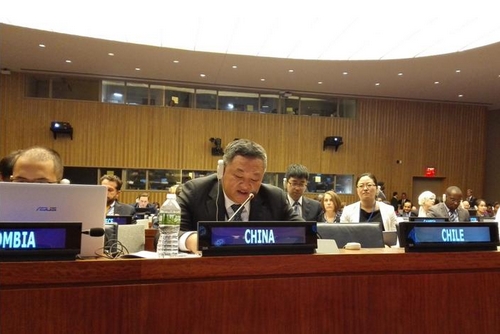| Statement by the Chinese Ambassador FU Cong at the Thematic Debate on Nuclear Weapons at the First Committee of the 71th Session of the UNGA |
| 2016-10-17 10:45 |
|
Mr. Chairman, China supports complete prohibition and total elimination of nuclear weapons, as well as the achievement of a world free of nuclear weapons. China always implements an open, transparent nuclear policy, and adheres to a nuclear strategy of self-defense. China has faithfully honored its commitments of no-first-use of nuclear weapons, and is the only nuclear-weapon state that has committed unconditionally not to use or threaten to use nuclear weapons against non-nuclear-weapon states or nuclear weapon free zones. China never provides nuclear umbrella for other states, nor does it deploy nuclear weapons on the soil of other countries. China has not and will never engage in nuclear arms race, and has always kept the nuclear force at the minimal level required by national security. China has always complied with its obligations prescribed under the Treaty on the Non-Proliferation of Nuclear Weapons (NPT), and spared no effort in enhancing the universality, authority and effectiveness of the NPT. China has already signed and ratified all additional protocols of the nuclear-weapons-free zone treaties which were open for signature. China supports the objectives and purposes of the Comprehensive Nuclear-Test-Ban Treaty (CTBT). Committed to promoting the early entry-into-force of the Treaty, China has honored the commitment of moratorium on nuclear test and made steady progress regarding domestic preparation for the implementation of the Treaty. In the last June, China sent a high-level delegation to the Ministerial Meeting of the Twentieth Anniversary of the CTBT, highlighting its firm support to the Treaty. China supports negotiating a non-discriminatory, multilateral and internationally effectively verifiable FMCT under the framework of the CD on the basis of the Shannon Mandate as early as possible. China opposes any attempt, even in disguised form, to start the negotiation of the FMCT out of the framework of the CD. China attaches great importance to the issue of transparency and confidence-building measures (TCBMs). In recent years, China has issued several White Papers and submitted to the NPT review conferences its national reports, comprehensively elaborating China's nuclear strategy, policies and related efforts. China actively prompts the P5 to implement the NPT review outcomes, and will continue to take the lead of the P5 Working Group on the Glossary of Key Nuclear Terms, with a view to contributing to enhance mutual understandings and trust on nuclear issues among relevant parties. China would like to make following proposals in terms of international nuclear disarmament process: First, universal security should be upheld as the guiding principle in nuclear disarmament. We should adhere to the new security concept underpinned by common, comprehensive, cooperative and sustainable security, fully respect and accommodate legitimate security concerns of all countries and abandon the outdated Cold War mentality, so as to eradicate the root causes of the existence and proliferation of nuclear weapons, and create necessary conditions for further progress in nuclear disarmament. Second, step-by-step and incremental approach should be adopted in nuclear disarmament. Complete prohibition and total elimination of nuclear weapons cannot be achieved overnight. On the contrary, it can only be obtained through a just, reasonable process of gradual reduction towards a downward balance. Nuclear-weapon states should publicly commit not to indefinitely hold on to nuclear weapons. Countries possessing the largest nuclear arsenals bear special and primary responsibilities for nuclear disarmament, and should further reduce their arsenals in a verifiable, irreversible and legally-binding manner. When conditions are ripe, all nuclear weapon states should join the multilateral nuclear disarmament negotiation process. Third, the authority of existing multilateral disarmament mechanisms should be preserved. The attempt to abandon existing multilateral arms control mechanisms such as the Conference on Disarmament and the NPT review process and to compromise the principle of consensus is counterproductive in a way that it cannot guarantee full and effective participation of all stakeholders and cannot produce any "meaningful" results. Fourth, global strategic balance and stability must be maintained. Nuclear disarmament must abide by the principles of maintaining the global strategic balance and stability; and undiminished security for all. The deployment of the global missile defense system undermines both the strategic stability and the nuclear disarmament efforts. China urges relevant countries to abandon the practice of seeking absolute strategic advantage expeditiously. Fifth, the role of nuclear weapons in national security doctrine should be effectively reduced. Effectively downplaying the role of nuclear weapons in national security policy will provide an important precondition and essential step to complete prohibition and total elimination nuclear weapons. No-First-Use commitment by nuclear weapon states is the most realistic step in this direction. China calls on all nuclear weapon states to make no-first-use commitment as well as unconditional commitment not to use or threaten to use nuclear weapons against non-nuclear-weapon states and nuclear-weapon-free zones. An international legal instrument to this effect should be negotiated. Thank you, Mr. Chairman. |
| |||||||||||||
| |||||||||||||
